Discover how a healthy diet can help you treat and prevent stubborn acne!
Teenage years can be rough when you have acne! Teens with acne often feel unsightly, to the point where they lack the courage to make eye contact with others. Acne could affect a person’s self-esteem and confidence to face the world. Did you know that incorporating an excellent teenage acne diet can help you significantly improve, maybe get rid of, stubborn acne?
What Causes Acne In Teens?
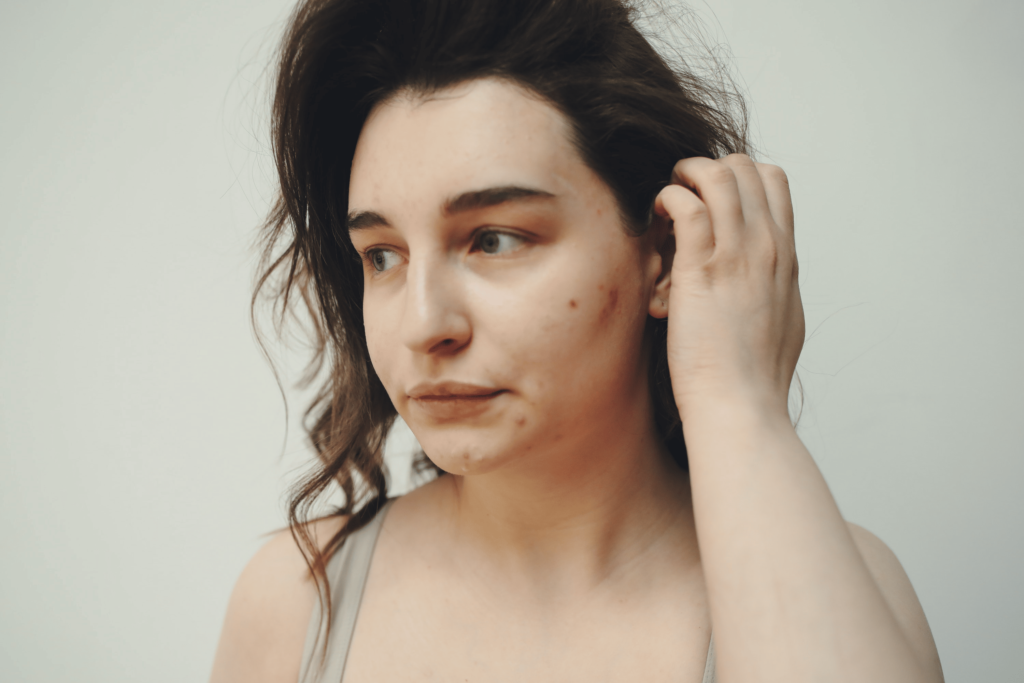
Acne develops when your skin’s pores become clogged with oil and dead skin. You may have acne if you develop pimples frequently, especially many at once. Acne is a skin condition that creates pimples.
“Acne” and “pimples” are often used interchangeably, yet they have different meanings. The most apparent distinction between acne and pimples is that pimples are a sign of a condition; acne is the ailment itself. Acne-prone skin may have pimples as part of their condition, but not everyone who gets the occasional pimple has acne-prone skin.
Contrary to what many believe, there is no particular “acne gene.” But acne does tend to run in families. Therefore, one possible explanation for why you suffer from acne is that one or both of your parents do.
However, factors other than genetics contribute to acne, including hormonal changes, puberty, cosmetics, stress, lifestyle, and diet.
Puberty makes your sebaceous glands create more oil because pubertal hormones increase, resulting in acne outbreaks.
Some cosmetics and hair care products include oil or other substances that might aggravate acne. Comedogenic cosmetic products clog the hair follicle and plug the pore. As a result, extra skin oil accumulates in the pore, clogging it and causing a blemish to appear.
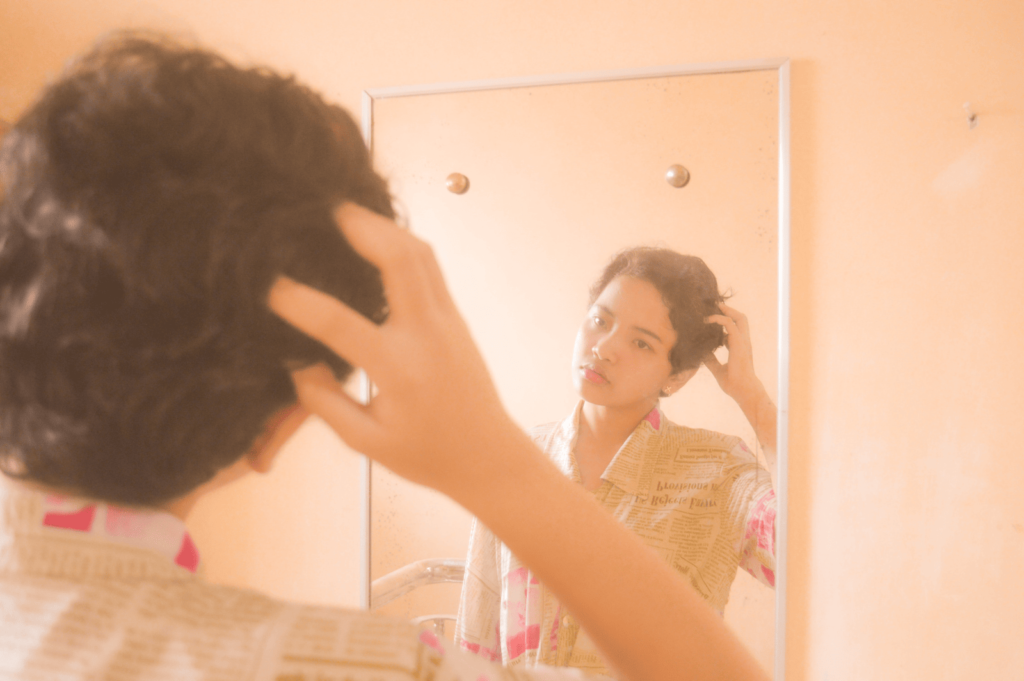
Acne is common. It affects up to 95% of Americans. But “common” doesn’t mean “normal.” Studies done with primitive cultural groups showed that people who only eat natural food (the food they hunted, gathered, and planted) never had a single acne in years!
Did you know that acne was nonexistent in the Inuit (Eskimo) population when they lived and ate their traditional lifestyle? Yes! It was because they were eating fresh, healthy, and preservative-free foods. But when they started to adopt a more westernized diet, they started getting acne.
Dermatologists later found that a Standard American Diet—pre-packaged and processed foods, refined grains, processed meat, and high-sugar drinks—could cause skin conditions and worsen acne.
How Does Diet Impact Acne
You might wonder, can food worsen acne? Diet affects hormones, which can aggravate acne and worsen our skin. Nutrition plays a vital role in teenage acne. So, the foods that you eat can affect your overall skin health.
Studies suggest that there is a correlation between the chances of having acne and the consumption of:
Sugar
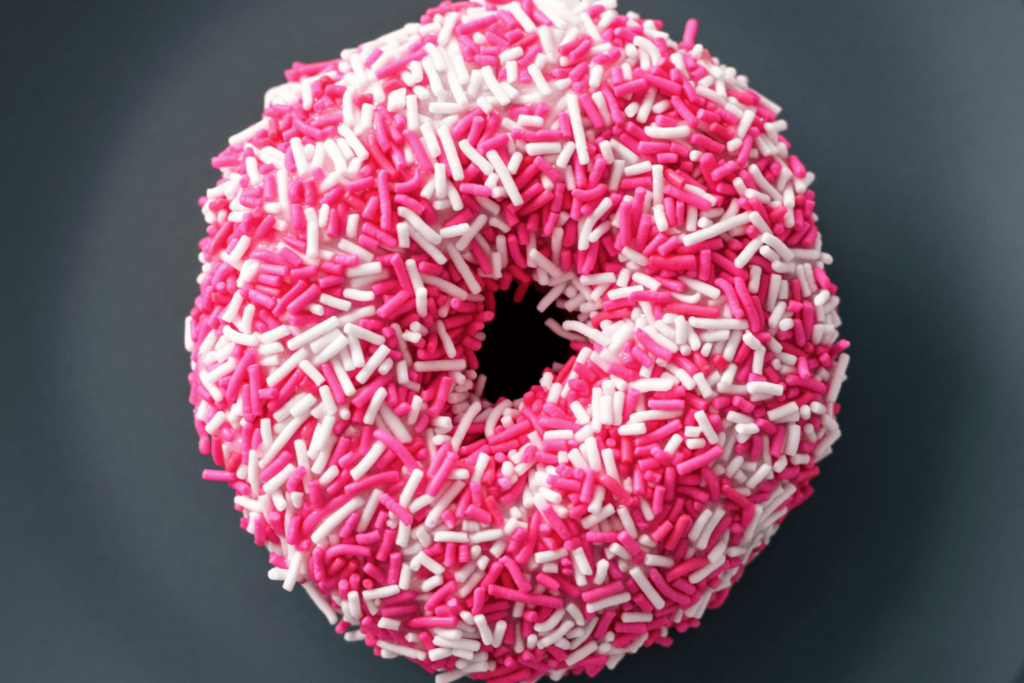
When your blood sugar climbs, it creates inflammation throughout your body by upregulating the production of certain chemicals. These increases also lead your body to generate more sebum, an oily substance secreted by our skin glands. Both inflammation and excess sebum can cause acne. It would be best to lessen high-sugar foods and beverages to reduce acne. Typically, blood sugar spikes when eating lots of carbs and processed foods.
Alcohol
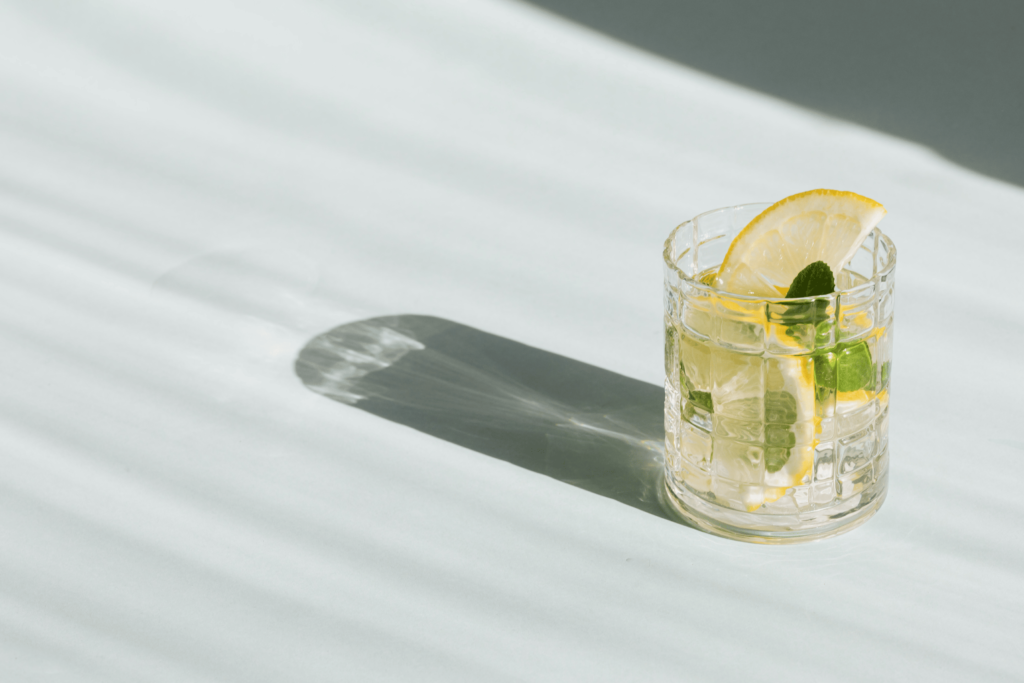
Alcohol alters your hormones, which might result in acne. Because alcohol can disrupt the equilibrium of your hormone levels, it is frequently associated with developing acne. Research suggests hormonal imbalances impact skin quality and pimple growth by affecting the cell signal system.
Dairy Products
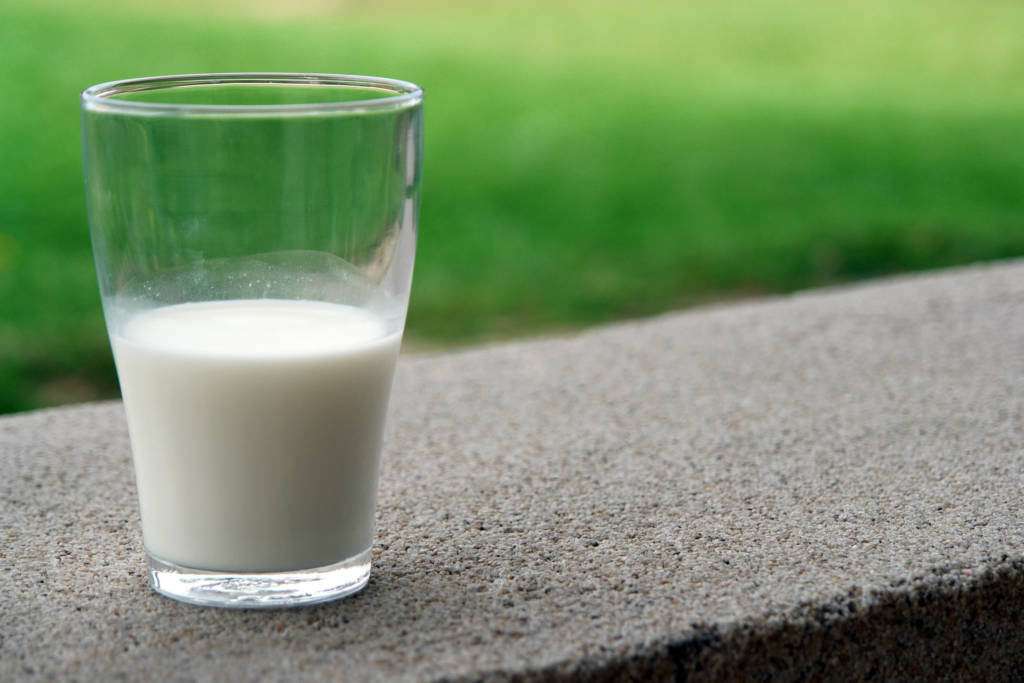
The majority of evidence-based studies agree that dairy products can aggravate acne. When we digest these proteins, they release a hormone similar to insulin (IGF-1). This hormone is known to cause breakouts.
Sometimes the hormones in milk interact with our hormones, confusing our endocrine system and signaling breakouts. These hormones are also injected into dairy animals to increase the yield with additional damage.
Omega-6 Fatty Acids
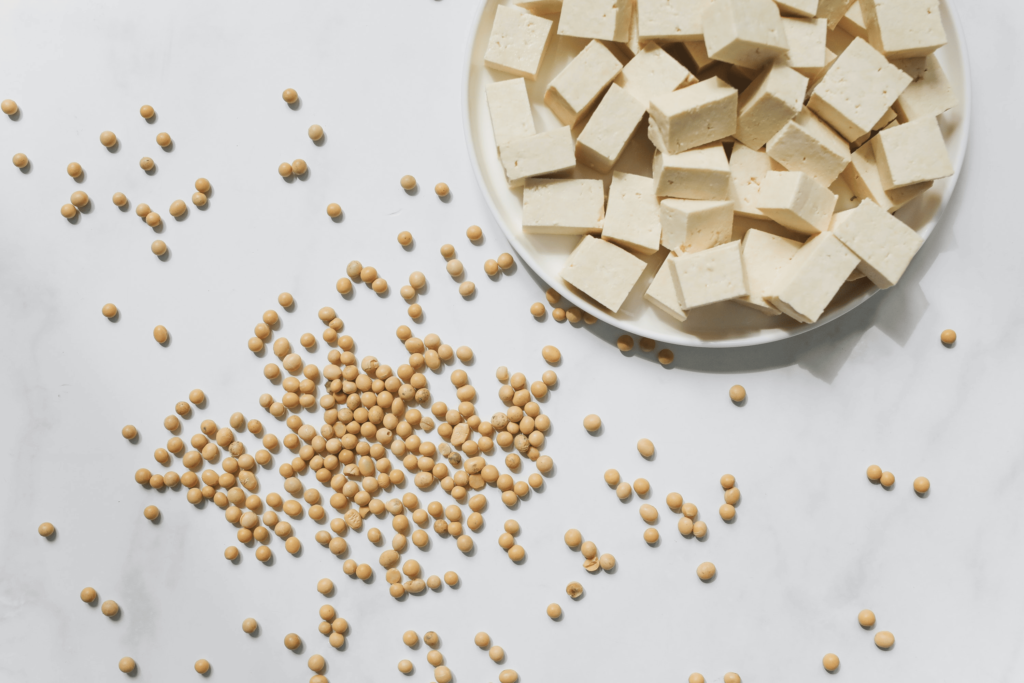
Omega-6 fatty acids are a form of polyunsaturated fat found in vegetable oils, nuts, and seeds. When consumed in moderation and substituted with saturated fats, omega-6 fatty acids can benefit the heart. However, researchers think an imbalance of omega-6 to omega-3 fats in the diet may cause acne.
Inflammation is the body’s natural response to outside invaders, such as poisons, germs, viruses, and physical harm. Inflammation is beneficial in moderation. It is your body’s technique of keeping a cut or bruise from becoming infected. Inflammation is also used to fight live invaders like disease-causing microorganisms.
Chronic inflammation is one of the underlying causes of acne, affecting millions of Americans each year. So if you wonder why your acne gets extra swollen after a night of drinking or ice cream binging, consider checking your food intake.
If you suffer from red, swollen, tender, and pus-filled pimples, then you might be experiencing inflammatory acne. These can occur on any part of the skin with oil glands, although they are common on the face, neck, chest, upper arms, and back.
Best Diet For Acne
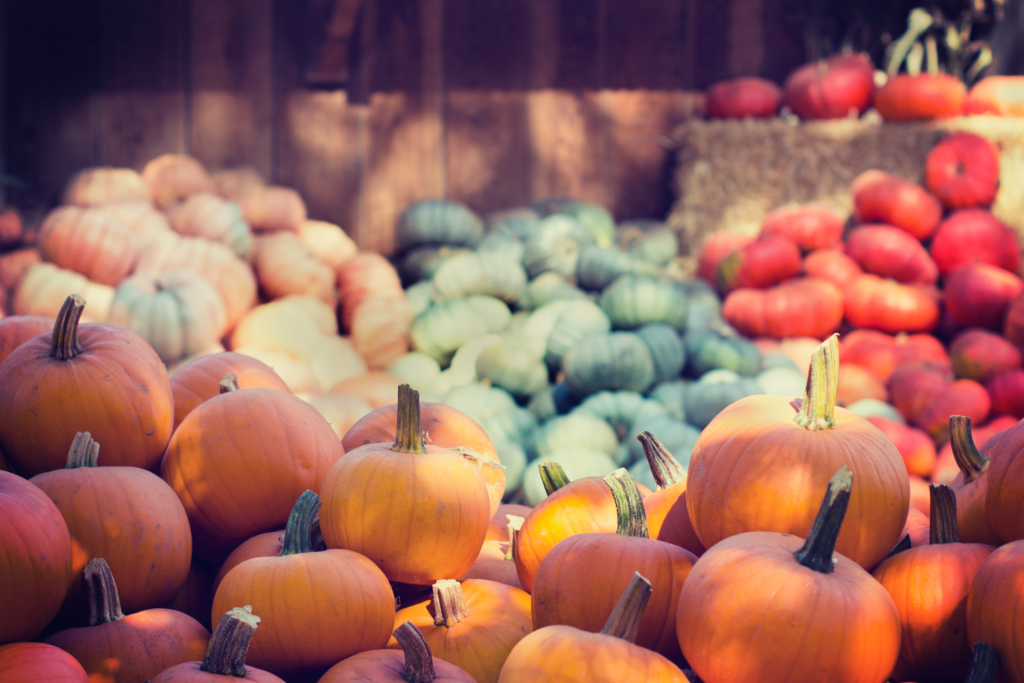
If you don’t believe that diet and acne are related, think again! Even though there is no definite “dietary solution,” some studies have shown that certain foods may help clear up acne and improve skin health.
So, what is the best acne diet? The best diet recommendation for acne is eating a balanced diet rich in fresh fruits and vegetables, healthy protein sources, and whole grains.
If you want to know more about how to clear your acne for good through food and lifestyle, this highly informative eBook may do the job. This eBook has helped hundreds of individuals clear their acne naturally without compromising their preferred restrictive diets.
Remember to consult your doctor before making other dietary changes.
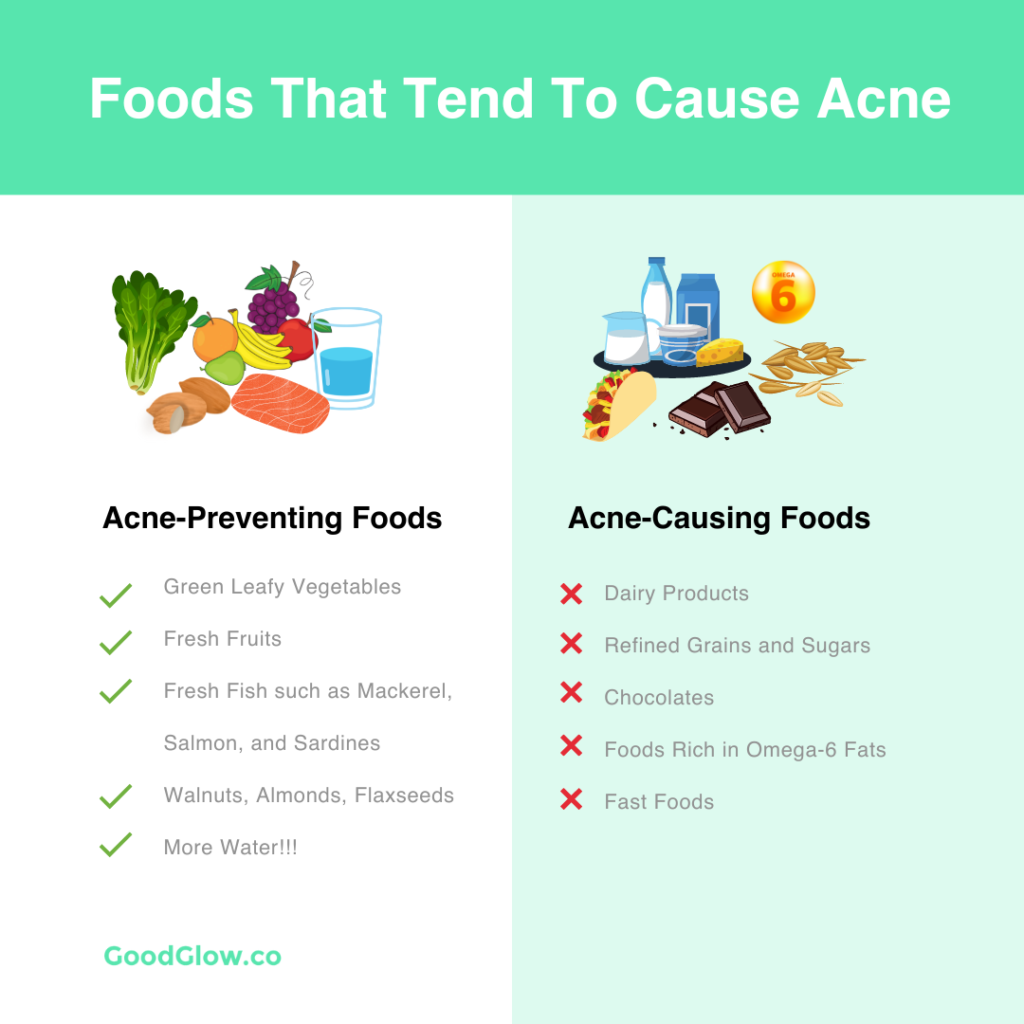
Can Supplements Help Clear Skin?
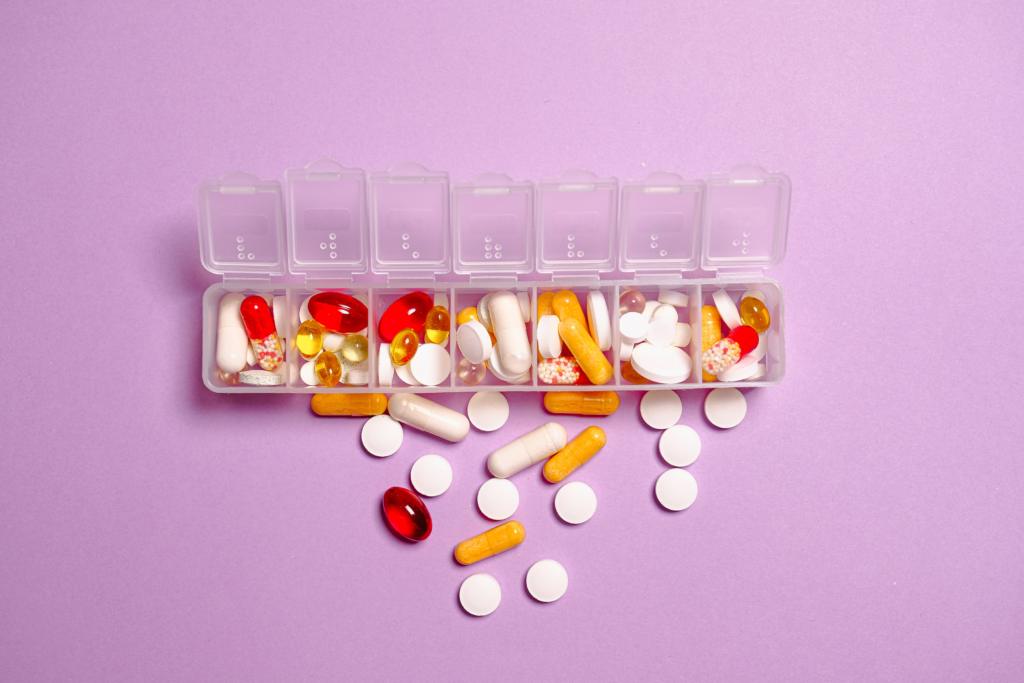
The market is saturated with all sorts of supplements claiming wondrous effects on our bodies. There are vitamins for hair, skin, teeth, sleep, and even sexual drives! Surely, you’ve heard of acne-reducing ones.
Supplements like zinc can reduce oil production in the skin and defend against bacterial infection and inflammation. Fish oil might help reduce inflammatory acne.
While vitamins and minerals from supplements can help in hormone balancing and acne treatment, supplements alone can’t finish the job, except for mild varieties of acne.
Eating slender fish and oysters is still the best option to achieve clearer skin instead of popping jelly tablets!
Conventional Treatments For Teenage Acne
If acne gets too stubborn and overwhelming, conventional treatments can help. Acne treatments range from over-the-counter topical creams to expensive prescription pills.
Birth Control Pills
Hormones found in birth control tablets can help in acne reduction. The pills reduce the circulation of androgens, which reduces sebum production. The tablets must include estrogen and progestin to be effective against acne.
Birth control pills, like any drugs, have some adverse effects. Nausea, weight gain, swelling of veins, and mood swings are typical side effects. Adjusting the amount or type of birth control pill can help to minimize adverse effects.
Accutane
Accutane is a popular anti-acne medication among celebrities and dermatologists. The drug has been advertised with several high-profile commercials and huge billboard ads!
Accutane treats acne by diminishing the oil glands to avoid blocked pores and slowing the growth of skin germs. It also has a strong anti-inflammatory effect. Many individuals acquire clean skin with only one round of Accutane.
But Accutane must be taken under dermatologist supervision only as it has several reported side effects, including dry skin, hair loss, and weight gain.
Antibiotics
These drugs can aid in treating severe, painful acne caused by bacteria on the skin. Antibiotics can also lower overall inflammation, which may minimize swelling and the likelihood of scarring.
It is crucial to note, however, that prolonged or repeated usage of oral antibiotics has serious side effects. They can disturb the equilibrium of someone’s gut flora by harming the good bacteria in the stomach. Antibiotic overuse can also lead to antibiotic resistance, which happens when bacteria change their biology to withstand the antibiotic treatment.
Topical Creams And Ointments
Benzoyl Peroxide is a well-known acne-fighting chemical that treats and prevents acne by eliminating germs beneath the skin and assisting the pores in shedding dead skin cells and excess sebum. It removes microorganisms trapped beneath the skin by peeling away the skin. Benzoyl peroxide can cause dryness, redness, and severe peeling.
Salicylic acid is classified as a beta-hydroxy acid. It is well-known for its ability to reduce acne by exfoliating the skin and keeping pores open. Although salicylic acid is generally regarded as harmless, it might cause skin irritation when initially used. It may also remove too much oil, causing dryness and discomfort.
While these conventional treatments can significantly clear acne, having a balanced and healthy diet is a better and safer long-term strategy.
Other Ways To Treat Acne
Acne is caused by multiple overlapping factors such as heredity, diet, and lifestyle. While food intake can be the more significant culprit, certain habits can also contribute to the condition.
Have you heard that your pillowcases and sheets might cause acne breakouts? When you don’t wash or replace your pillowcase regularly, a buildup of filth and oil from the environment and your skin and hair touching the pillow is transmitted back to your skin. This can cause pores to clog and become inflamed.
You can try silk pillowcases to reduce friction and rubbing while you sleep. You can also try switching to hypoallergenic detergents if strong-scented soaps trigger inflammation on your skin. It is not the be-all and end-all of acne prevention, but it can assist in avoiding acne and relaxing your face.
Frequent washing of your face three to four times a day, with mild soap and lukewarm water, does help too.
Certain skincare products and makeup can also trigger acne. Try using non-comedogenic and oil-free products to lessen such incidents. Non-comedogenic products are formulated to avoid pore blockages and breakouts.
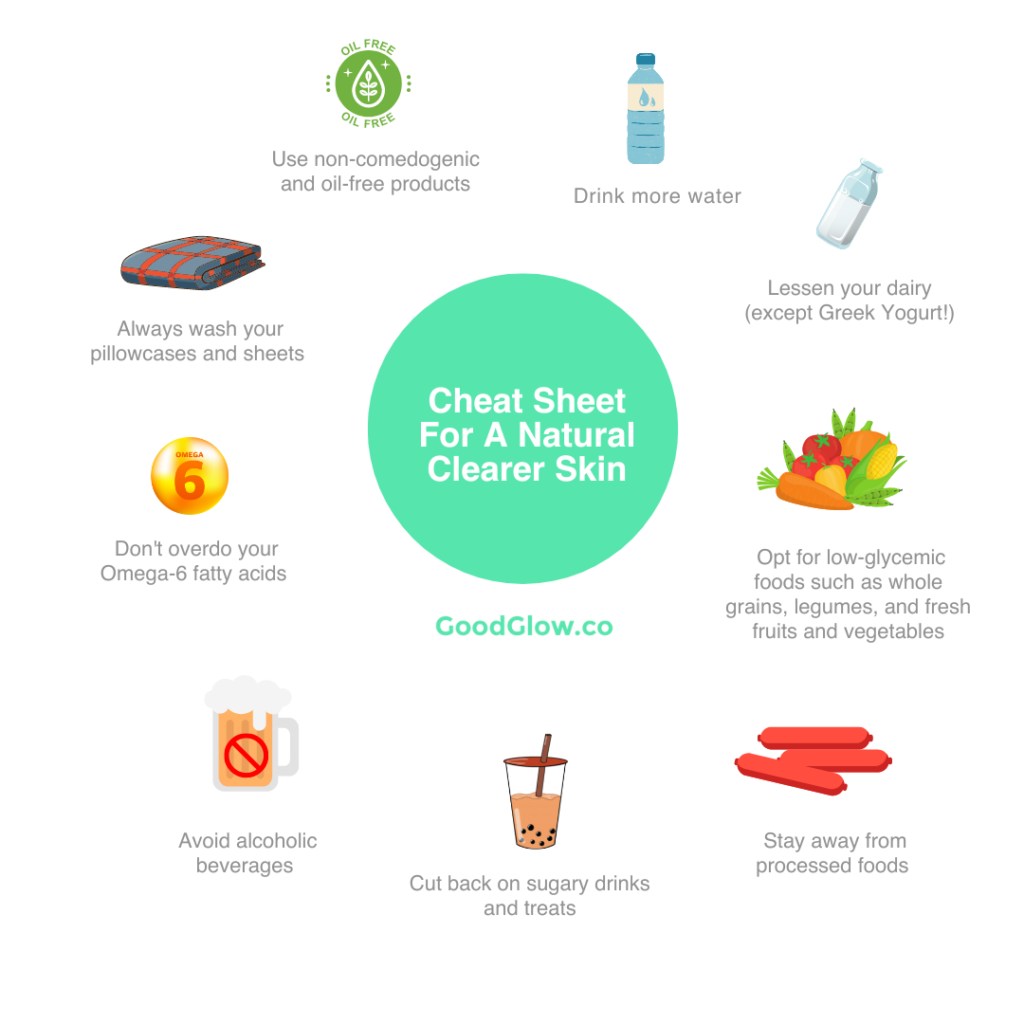
Conclusion
Acne can be challenging for teens, but many effective treatments are available to help reduce outbreaks, repair the skin, and avoid scarring. A healthy and balanced acne diet can be a great long-term strategy if you are uncomfortable trying other conventional acne treatments. Remember, our bodies are reflections of what we consume. So, eat wisely!
FAQs
Q: What Foods Help Reduce And Prevent Teenage Acne?
A: Consuming low-glycemic diets high in complex carbs may lower your chances of acquiring acne. These foods include whole grains, legumes, unprocessed fruits, oats, unrefined starch, and vegetables.
Avoid sugary drinks, sweet treats, dairy food, excessive alcohol intake, and fried food. Use this highly informative eBook to learn more about the best acne diets.
Q: What Helps Teen Acne Naturally?
A: Supplements and conventional treatments can help with acne management, but incorporating a healthier and more balanced diet, with some lifestyle adaptations, including getting enough exercise, rest, and sleep, can help get clear and acne-free skin naturally.
Sources:
Cordain, Loren, et al. “Acne Vulgaris.” Acne Vulgaris: A Disease of Western Civilization | Acne | JAMA Dermatology | JAMA Network, 1 Dec. 2002, jamanetwork.com/journals/jamadermatology/fullarticle/479093.
Cordain, Loren, et al. “Acne Vulgaris: A Disease of Western Civilization – PubMed.” PubMed, 1 Dec. 2002, pubmed.ncbi.nlm.nih.gov/12472346.
“Can The Right Diet Get Rid of Acne?” Can The Right Diet Get Rid of Acne?, www.aad.org/public/diseases/acne/causes/diet. Accessed 4 Nov. 2022.
Aghasi, Mohadesh, et al. “Dairy Intake and Acne Development: A Meta-analysis of Observational Studies – PubMed.” PubMed, 1 June 2019, pubmed.ncbi.nlm.nih.gov/29778512.
Kucharska, Alicja, et al. “Significance of Diet in Treated and Untreated Acne Vulgaris.” PubMed Central (PMC), 16 May 2016, www.ncbi.nlm.nih.gov/pmc/articles/PMC4884775.
Wood, Sam. “The Ultimate Guide to Curing Inflammatory Acne – GoodGlow.” GoodGlow, 2 June 2018, goodglow.co/chronic-inflammation-acne.
“How Does Your Diet Affect Acne? | Acne Treatment.” YouTube, 17 Apr. 2012, www.youtube.com/watch?v=7Tye3TcV86E.
Heenan, Kyra. “The Top 14 Supplements for Clearing Acne Breakouts – GoodGlow.” GoodGlow, 16 June 2018, goodglow.co/best-supplements-for-acne.
“Understanding Acne Treatment.” WebMD, 10 Sept. 2020, www.webmd.com/skin-problems-and-treatments/acne/understanding-acne-treatment.

